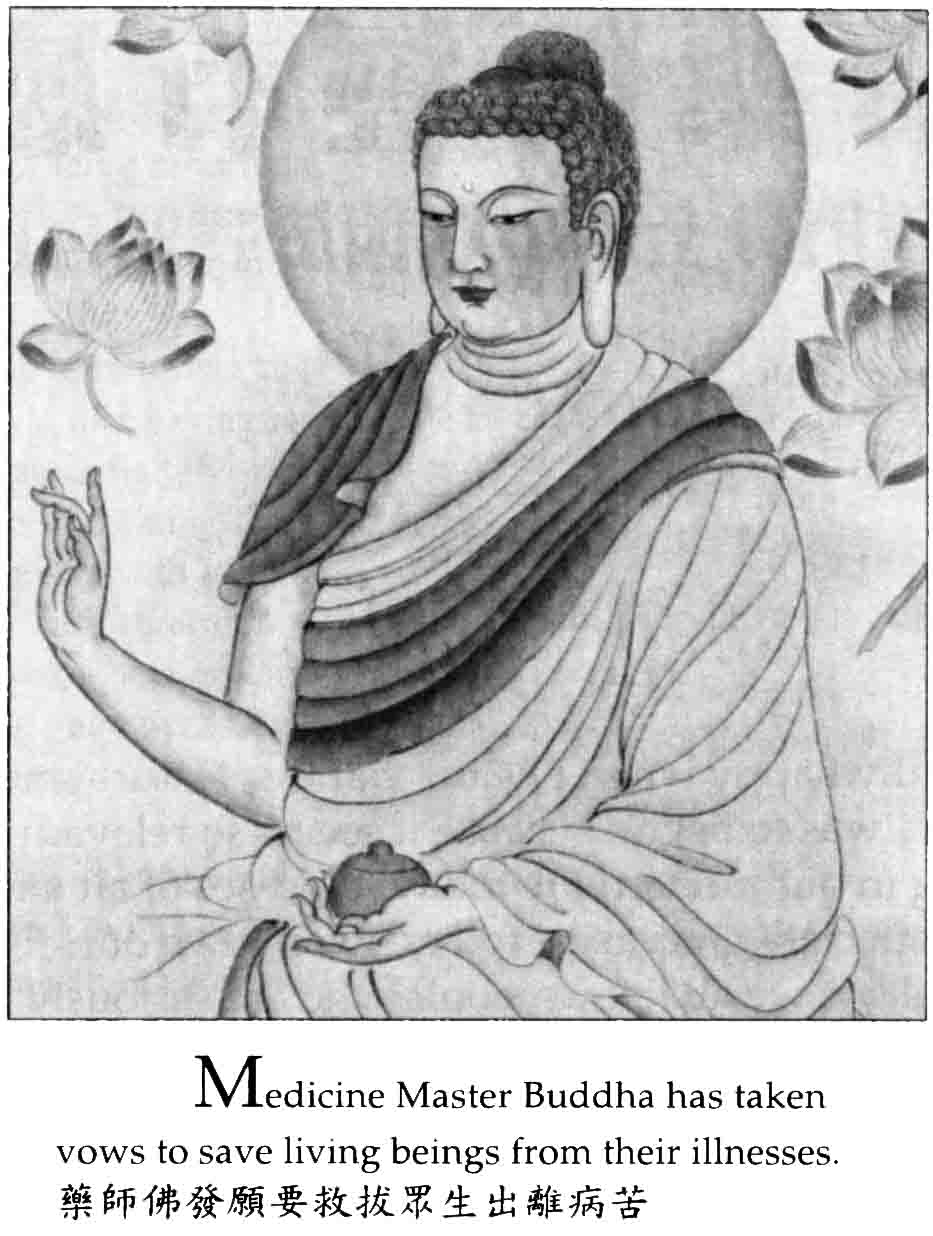|
當我聽到要開始講藥師經時,我是特
別的高興,因為這部經似乎對我們的日常生活及在今日摩登時代所發生的事情很切合。各種肉體上及精神上的疾病,在今日似乎是特別的普遍。即使我們自己或我們
的家人都很健康,我們都會認得一些病得很嚴重或有慢性疾病的人。而且我們看報章雜誌,或看電視時都免不了會看到在我門社會裡存在著更大幅度的疾病。各重病
痛的名單越來越長。每年或每數年就有一種以前未曾有過的新病加到這名單上。而這些疾病治癒或去除是少之又少。
美國的健康危機日益嚴重,不僅僅是因為愛滋病的關係,還有其他疾病如阿耳滋
海默氏病(早老性癡呆症)大多影響老年人。除此之外,還有醫療保險危機。我們知道,有些人生病時,花不起醫藥費去看醫生;而我們呢,雖然有健康保險,也可
以去看醫生,但是要付很高的保險費。生病的代價,在金錢上及肉體所受的苦上,都是很高的;我們很多的時間,精力,及生活資源,都花在疾病的預防或治療上。
美國人對於為什麼我們會生病,以及如何恢復健康的態度有很大的不同。很多人
認為疾病是發生在他們身上的一種外來的,神秘的過程––是外在的,自天而降的,不請自來的,不應得的。又有些人認為疾病是醫生可以處理的一種東西。很久以
來,西方醫學對這種態度一直予以鼓勵,並鼓勵病人期待他們的醫生完全治癒他們的病。最近西方醫學開始承認他們自己的限度,而且開始尋求病人的協助,來幫他
們自己恢復健康,並預防疾病;醫生們也開始在找尋人們的態度對疾病及復元過程的影響。這種各人責任的轉移與佛教一直強調的––發生在我們身上的事起因於我
們自己––我們自己的心及行為是相同的。這種轉移使得我們在這裡所做的事,更切合外面社會主流所發生的事。
因此雖然我以前並沒有研究過這部經,我把它視為一個讓人對健康與疾病的作用
加思考的機會。這一連串的講經活動,可以用為使我們對精神與肉體的習慣看得更清楚的一個動機––使我們更加留心––尋找健康與不健康的基本原因。
雖然藥師佛發願要救拔眾生出離病苦,我不認為我們就可以完全仰賴這位佛來救
我們;除非我們已走頭無路了,否則這會像是完全依賴醫生來把我們治好。佛教講的是對發生在我們身上的事,我們自己要負起責任來,而且仔細觀察我們的習性如
何導致好的或不好的事情發生在自己身上,同時找出法子來調節我們的行為。
|
|
I was
especially happy when I heard that this lecture series on the Medicine
Master Buddha Sutra was to begin, because it seems so relevant to our
everyday lives and to what is happening in our modern life today.
Illnesses of all kinds, both physical and mental, seem to be especially
pervasive today. Even if we ourselves are healthy or if our family is
typically healthy, we all know people who are seriously or chronically
ill. Also, we cannot read a newspaper or a magazine or watch TV without
being made aware of the larger spectrum of disease in our society. The
list of illnesses that exist gets longer and longer. Every year or
every few years, newly identified diseases that didn exist previously
get added to this list. Seldom are any of these illnesses eliminated or
a cure found for them.
 |
Here in the United States, there is a growing
health crisis, not only because of AIDS, but also because of other
diseases, such as Alzheimer’s disease, that mostly affect the elderly.
In addition to that there is a health insurance crisis. We know that
there are people who cannot afford to see a doctor when they are ill;
but even if we have health insurance and access to doctors, we pay a
lot for it. The cost of being ill is very high in dollars and in
suffering. A lot of our time, effort, and resources in life are devoted
to either preventing illness or treating it.
Among Americans, attitudes about
why we are ill and how we get healthy again vary a lot. Many people
think of an illness as some kind of alien and mysterious process that
“happens” to them—something that is external, that comes to them out of
the blue, uninvited and undeserved. Also, some people think of their
illness as something that a doctor fixes. For a long time Western
medicine has encouraged this attitude and encouraged patients to look
to their doctor for the total cure. More recently, Western medicine has
begun to admit its limitations and to seek more assistance from the
patient in getting healthy again and in preventing future illness.
Doctors are beginning to look at how people’s attitudes contribute to
an illness and to the healing process. It is this shift towards
personal responsibility that parallels what Buddhism has emphasized all
along—that the causes for what happens to us begin in ourselves—in our
own minds and in our own behaviors. It is this shift in emphasis that
makes what is happening in mainstream society fit more with what we do
here.
So although I haven’t studied this
Sutra before, I see it as an opportunity to think more about the
mechanics of health and illness. This lecture series could be used as
motivation to take a closer look at our mental and physical habits—to
become more mindful—to look at the origination of both good and bad
health.
Although Medicine Master Buddha
has taken vows to save living beings from their illnesses, I don’t
think this means that we should rely totally on this Buddha to save us
unless our circumstances are extreme. That would be like relying
totally on our doctor to cure us. The point of Buddhism is to take
responsibility for what happens to us and to observe very closely how
our habits actually lead to something positive or negative happening to
us and to find ways to regulate our behavior.
|